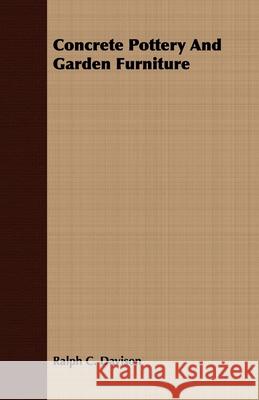Concrete Pottery And Garden Furniture » książka
Concrete Pottery And Garden Furniture
ISBN-13: 9781443732260 / Angielski / Twarda / 2008 / 216 str.
Concrete Pottery And Garden Furniture
ISBN-13: 9781443732260 / Angielski / Twarda / 2008 / 216 str.
(netto: 164,37 VAT: 5%)
Najniższa cena z 30 dni: 170,25
ok. 16-18 dni roboczych.
Darmowa dostawa!
PREFACE: MUCH interest has been manifested of late in ornamental concrete, and so little seems to be known about the un- limited possibilities of the artistic treatment of this material, that the author has endeavored in the following chapters to explain in detail how concrete can be made into objects of art. Numerous inquiries have come to me from craftsmen who are anxious to work in this material but none of whom understand the nature of the material or the method in which it is to be handled. It is such in particular I had in mind when preparing this work and have therefore been most minute in my descriptions of how the various pieces described are to be made. I have taken for granted that the reader knows nothing whatever about the material and have explained each progressive step in the various operations throughout in detail. These directions I have supplemented with illustrations which I have endeavored to make so clear that no one can misunderstand them. The method of using wire forms as a base on which to build up the finished piece is original with myself as far as I know, as is also the development of color work in cement. The chapter on the latter as well as those on Garden Furniture should appeal strongly to the professional as well as the layman inasmuch as there is a large and growing demand for this class of work. The amateur craftsman who has been working in clay will especially appreciate the adaptability of concrete for pottery work inasmuch as it is a cold process throughout, thus doing away with the necessity of kiln firing, which is necessary with the former material. The textures which can be obtained on articles made of concrete, as described in the chapter on aggregates, in many instances are far superior to those which can be obtained with any other materials, as they have a distinct characteristic of their own and are full of life and sparkle. Preface If the reader derives as much pleasure as the author has done in experimenting with the material and in making the various articles described throughout the following pages the purpose of this work will have been accomplished. RALPH C. DAVISON. COntents inlclude: CHAPTER I. MAKING WIRE FORMS OR FRAMES i CHAPTER II. COVERING THE WIRE FRAMES AND MODEL- ING THE CEMENT MORTAR INTO FORM. 10 CHAPTER III. PLASTER MOLDS FOR SIMPLE FORMS 19 CHAPTER IV. PLASTER MOLDS FOP OBJECTS HAVING CURVED OUTLINES 33 CHAPTER V. COMBINATION OF CASTING AND MODELING AN EGYPTIAN VASE 45 CHAPTER VI. GLUE MOLDS 59
PREFACE: MUCH interest has been manifested of late in ornamental concrete, and so little seems to be known about the un- limited possibilities of the artistic treatment of this material, that the author has endeavored in the following chapters to explain in detail how concrete can be made into objects of art. Numerous inquiries have come to me from craftsmen who are anxious to work in this material but none of whom understand the nature of the material or the method in which it is to be handled. It is such in particular I had in mind when preparing this work and have therefore been most minute in my descriptions of how the various pieces described are to be made. I have taken for granted that the reader knows nothing whatever about the material and have explained each progressive step in the various operations throughout in detail. These directions I have supplemented with illustrations which I have endeavored to make so clear that no one can misunderstand them. The method of using wire forms as a base on which to build up the finished piece is original with myself as far as I know, as is also the development of color work in cement. The chapter on the latter as well as those on Garden Furniture should appeal strongly to the professional as well as the layman inasmuch as there is a large and growing demand for this class of work. The amateur craftsman who has been working in clay will especially appreciate the adaptability of concrete for pottery work inasmuch as it is a cold process throughout, thus doing away with the necessity of kiln firing, which is necessary with the former material. The textures which can be obtained on articles made of concrete, as described in the chapter on aggregates, in many instances are far superior to those which can be obtained with any other materials, as they have a distinct characteristic of their own and are full of life and sparkle. Preface If the reader derives as much pleasure as the author has done in experimenting with the material and in making the various articles described throughout the following pages the purpose of this work will have been accomplished. RALPH C. DAVISON. COntents inlclude: CHAPTER I. MAKING WIRE FORMS OR FRAMES i CHAPTER II. COVERING THE WIRE FRAMES AND MODEL- ING THE CEMENT MORTAR INTO FORM. 10 CHAPTER III. PLASTER MOLDS FOR SIMPLE FORMS 19 CHAPTER IV. PLASTER MOLDS FOP OBJECTS HAVING CURVED OUTLINES 33 CHAPTER V. COMBINATION OF CASTING AND MODELING AN EGYPTIAN VASE 45 CHAPTER VI. GLUE MOLDS 59











